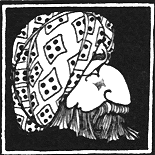 |  |
Wild at Heart Homepage | Contents | Previous Chapter
CHAPTER V
THE HOUSEHOLD OF PIRI RAM
1

Piri Ram, far advanced as he was in the heavy dreams that hemp flowers, properly prepared, provide for the smoker thereof, was a man of too many interests to ignore a cry of “Thief!”
In such moments each of us sees the thing that he loves best; and Piri Ram had a very clear vision of a certain tin box that lay under an innocent pile of dried dung-cakes on the mud floor of his home. This box contained, besides a bundle of greasy ten-rupee notes, a bag of silver, and some massive jewelry, all the records of a long and arduous career of profitable money lending. The private ledger, whose hieroglyphics scorned to denote any lesser rate than cent per cent.; the notes of hand, the mortgage deeds--all the assets whereon his comfort, his dignity, nay, even his pipe of charas depended--all lay, as good as naked, in that flimsy box under those flimsy dung-cakes. How often had he registered a vow that he would bury the box well underground! How often, alas!--since to a stout man stooping was irksome and digging disastrous--had he replaced the dung-cakes and muttered, “To-morrow it shall be done!” And now a cry of “Thief!” He was being punished indeed.
He dragged himself from his dreams--and none too soon, for the fakir, discreetly provided with sufficient petty cash for his immediate needs, was already legging it up the street. He hurled himself off the platform of pounded mud, which served for the less formal ministrations of this and sundry other wandering priests, and began to lumber up the street, his dingy white shirt-tail billowing out behind him, the loose flesh in calves and cheeks and chins jumping quaintly at every step.
 Nor was he alone in his activity. The more cautious spirits were barring their doors from the inside; but a few of the bolder ones were out, brandishing lathees and muzzle-loaders, and shouting. For the cry of “Daku” had been heard before in Kotahbagh, which lay so open to black jungle, and it had meant--as, alas! it generally means--cold-blooded murder and rape and flames.
Nor was he alone in his activity. The more cautious spirits were barring their doors from the inside; but a few of the bolder ones were out, brandishing lathees and muzzle-loaders, and shouting. For the cry of “Daku” had been heard before in Kotahbagh, which lay so open to black jungle, and it had meant--as, alas! it generally means--cold-blooded murder and rape and flames.
This, too, Piri Ram saw clearly. It may be said that he saw the very knife at his throat. But he had not run the length of Kotahbagh street for many years, and his flesh rose up against him. He had to pause for breath before he had covered half the distance to his house; and it chanced that another venerable, if less conspicuous, citizen proceeding in the opposite direction was at the same moment put under a like necessity.
It was Tota the tanner, a lean greybeard.
“Whence came the cry?” gasped Piri Ram.
“From--from thy house, O Piri Ram.”
Tota, whose name figured prominently in the private ledger, was obsequious.
“From my house? My house? Who gave it?”
“Thy daughter, O Piri Ram.”
“My house! My daughter...”
The words trembled on his lips, though his mind’s eye was fixed, not, as might have been supposed, on a ravished daughter or even on a blazing house, but on a tin box under a heap of dung-cakes. He broke into an agonized trot, pursued by remarks that Tota intended to be re assuring:
“Thy daughter is virgin yet. Run, and thou mayest still be in time, O Piri Ram. Thy house...” piped the tanner.
“Fool! My box!” groaned Piri Ram.
2
It is scarcely to be wondered at that Piri Ram, when the alarm had been traced to its source, lost his temper.
A beardless, boy-faced dakoit, warming his hands by the fire, taking to his heels at the mere sight of as ugly, misshapen a whelp as ever had shamed an unfortunate father--who had ever heard of the like?
There had been a boy? Oh, doubtless there had been a boy. More than one, like enough. Even the sorriest she jackal will have her courtiers, on a moonlit night, or when, for instance, a father chances to go out for a pipe of charas. Unless she show her face, that is.
So far, between puffs and pants, proceeded innuendo. But worse was to follow.
In the region of his ribs, among the folds of some obscure nether garment, a little lump was found to be missing--a little lump that represented six rupees, five annas, nine pies, in calico bag. There was a lightness, a void, where there should have been comfortable solidity.
It was “My bag!” then, as, with his daughter cowering before him, Piri Ram hurriedly investigated, fold by fold, his complicated underwear. A few twists of brown paper, containing reserve supplies of his favourite drug, came at length to light, but not an anna, not even a pie, of small change. Though he shook the garment in question and laid it out flat and examined it by the light of a hurricane lantern, it yielded him nothing.
There was no hope. Clearly he had lost the bag. It must have worked out in the general upheaval of his person caused by prolonged and unwonted running. And whose fault was it that he had had to run?
Kneeling on his cold knees--exasperating attitude at the best of times for a portly man--he eyed the scapegoat.
She was a little wisp of a thing, not five feet high. Her name, Parmala, means in Hindi “a garland,” but she by no means bore out in her person its suggestions of color and exuberance. Her coarse sari, exiguous as it was, seemed all too big for her and obviously enough concealed no curves. Her cheap glass bracelets and her brass anklets--the only attempts at adornment--seemed to mock at the thin arms and legs that filled so small a part of their circumference. She was hardly mature; or, if mature, sadly underfed.
Yet there was that in her face that would have moved the pity, even the interest, of any man: an unexpected sensitiveness, a wistfulness. It was an expressive face, capable at least of joy, though somewhat heavily scored with the lines of tragedy. Drudge was written all over it; yet it was spared the baser marks of drudgery, for it was neither mean nor sordid. It was, in fact, rather an innocent face. Properly nourished and washed, it would have won a second look from almost any man. Few men, at least, could have eyed it as Piri Ram did.
Clearly she knew what to expect and, as clearly, feared it. Her father’s tongue--pooh! But her father’s silence--that was quite another matter. And those little eyes roving up and down, up and down, marking in advance the spots where a bamboo with rings in it and a split end would best tell--there was a calculating look in them that Tota the mochi would instantly have recognized; a look quite as relentless as, in justice it must be said, a village money-lender’s needs to be.
“Who stirred up the village for naught? Thou! Who roused a man from his pipe and his dreams? Thou! Who caused that man to run and, running, to lose six rupees, five annas, nine pies, not to speak of a calico bag of the value of two pice? Thou!
“Thou, thou, thou! There is altogether too much ‘thou.’...Misbegotten!”
The indictment had proceeded slowly and dispassionately in Piri Ram’s best village-council manner; but the last word amply balanced with its concentrated venom the judicial calm of the rest. It was flicked out like a sting, and its note was high treble. It is significant that not till then did the girl fall on her knees.
3
Kotahbagh, not without experience of such matters, listened critically and, on the whole, with enjoyment.
There had been a false alarm. Songs, conversations, business transactions had been rudely interrupted; dinners had been overcooked, or not cooked at all; dignitaries and dignitaries’ wives had been seen abroad in scanty clothing, by unworthy eyes. For all this some one, obviously, should pay. And if the some one chanced to be Piri Ram’s slip of a girl, pretending to be ravished, why, Kotahbagh knew that trick from its cradle! Besides, did it not prove that women were at the bottom of all evil?
“Piri Ram is angry. Perhaps he will hit her head. Then he will be hanged by the sircar, and we shall be free of our debt,” muttered the men.
“She is flat-chested. No man will look a her, but they say she...” whispered the women.
So Kotahbagh, if not charitably inclined, was fairly appeased. Piri Ram, said public opinion, was upholding creditably the dignity of fathers A pity, though, that there were no screams There should, at any rate at first, have been some screams.
But Parmala, lying on a rag bed in the cramped crib that Piri Ram called his woman’s quarters, had long ago learned the futility of screaming which only serves to inflame wrath. For there had been other women from time to time in that stifling kennel, including her own mother, and they had been foolish enough to scream. Also in this case it would have been impossible, since he had held her by the throat.
Indeed, there had been moments when she had hoped that he might earn a hanging. But his breath had failed him too soon--a doubtful mercy, since to-morrow he would certainly beat her again, unless he happened to sleep the day out.
She could hear him now, through the match- board partition, snoring. The charas, then, had already reclaimed him. But for her there would be no sleep. Sleep was difficult enough on ordinary nights, with bones that met the hard floor however one might turn. Now, impossible.
Some women, she knew, would have powdered a little glass and sprinkled it in his rice, or have used a thin knife in the soft place just below the armpit. One woman had, in fact, attempted both expedients, before she had disappeared. But of course Piri Ram would see through that, as he had seen through it before.
“I see through walls. I see through heads. Such things belong to my calling,” he would often say, and no one in Kotahbagh doubted the truth of it. There was evidence to spare of his excellent eyesight.
Besides, he was her father. She could not actually kill her father. Better not to think of him...
That boy, now, the boy who had caused all the mischief--what was he?
He had looked like a dakoit. Long hair, naked body, ungodly eyes--thus the dakoits had looked whom she had seen taken away in chains after the burning of Kullu’s granary two years back. Still, they had had black beards, while this boy was beardless, and--had run from a woman. Perhaps after all he was no dakoit.
What then? Hindu? Mussulman? Plainsman? Hillman? Tharu? Who could say?
But--how he had run!
Light-footed, bounding like no boy that she had ever seen; more like the deer that came for the young wheat; yes, more like something wild.
Naked. Quite naked. Not even a rag round the loins. Only beggars and priests went like that. She had seen one like that, shamelessly begging from door to door in Kotahbagh. But that one had worn the scarlet mark on his forehead and white powder on his chest. This one had worn not even that. Yet this one, somehow, had not seemed shameless.
Was he, then, a casteless beggar, a vagabond? That seemed likeliest, indeed explained all; except that he had not begged. Nor, apparently, had he stolen. He had only warmed his hands. To be hungry,--for surely he must have been hungry!--to sit within a pace of a boiling pot and within five paces of an open door, and only to warm the hands! Was there ever such a vagabond?
She had been afraid. Why had she been afraid, who was not afraid now? If he were to come back now (but of course, after the uproar, he would never come back) she would almost throw a handful of pulse into his begging-bowl (had he a begging-bowl?) and top it with a chupatty...almost. Then, surely, she would have thanks from him, and perhaps some god’s blessing! Beggars, it was said, gave good words; and surely an excellent blessing would fall from one who was hungry and yet would not eat, who only warmed his hands!
Cursings, too. Black charms. So it was said. Suppose--
Suddenly Parmala sat up. Shut off from mankind, kenneled ever since she had been marriageable, she nevertheless had her share of woman’s intuition. She knew one man--her father, to wit--remarkably well, and could put her finger unerringly on his weak spot, on the thing that he feared most. Curses, evil eye, evil omen-these things he feared; but most of all, curses. The only debt that he had ever forgiven had been the hundred rupees of one competent to curse. That she knew, though no one else did. But all the world knew that those who feared curses were most in danger from them.
The idea pleased her.
Suppose the beggar could be found and fed. She had seen him running toward the forest, and pleasant it would be to find him asleep somewhere among the trees; to wake him; to watch the opening of his eyes; to put warm food by him...
For the moment she forgot her real purpose in the thrill of contemplating the adventure that would make it possible. To steal away into the moonlight,--she who was never allowed outside the high mud wall,--to forget for a little the heat, the smell of rags and dirt, and to breathe clean air; to be out of sight and sound of Piri Ram--the thought of all this gave her unfamiliar, tremulous, pleasing sensations. Actually she began to smile to herself.
But...the beggar?
Would he cut her throat for her bangles and throw her down a well, as Chhotu had done to the sister of Bhim Singh? No, surely he could not. But would he beat her?
Somehow even that thought did not appal her. A beating by a stranger would at least be better than a beating by Piri Ram. Besides, he might not beat. He had not looked particularly strong. And he had certainly run away from a woman. Who could say for certain that he would beat? She had no knowledge of men or what they did. Except Piri Ram, and his brother from Meerut, and the priest who had stolen in one evening to ask where Piri Ram kept his money, she had never spoken to a man. It would be pleasant, then, to speak to a man.
But she was forgetting. The curse, the curse that he would surely give in exchange for food--that was the main thing. For that she would steal out, taking a little pulse in a bowl, and search for the stranger, now, while the fumes were heavy in her father’s head. The moon was up. She could hardly fail to find him with the moonlight to help her.
Her mind was made up. Very quietly she rose, drew her sari like a hood over her face, and crept under a curtain into the main room of the house. A little moonlight fell from the square hole high up in the wall that served as window, and revealed Piri Ram, bare-chested and obese, snoring on his charpoy in the corner where the dung-cakes were piled. From another corner came the glint of brass vessels. Taking a small one, she filled it with boiled pulse; topped the pulse with a chupatty; and, wrapping the whole in a cloth, hid it under her sari. Then, flitting like a wraith across the room, she stealthily unbarred the door and slipped out.
The white dust of the uneven street had a radiance as of silver, and there was silver too upon the houses. What had been a village of opal was now one of silver and of pearl. But Parmala did not stay to admire. She hurried round the corner of the house into her father’s field, and began to cross it in the direction of the black trees whither she had seen the boy running. Once she started and half came back, when grey shadows took life and bounded ahead of her. But she saw in time that they were only apes, and, hugging her brass bowl to her breast, flitted on her way.